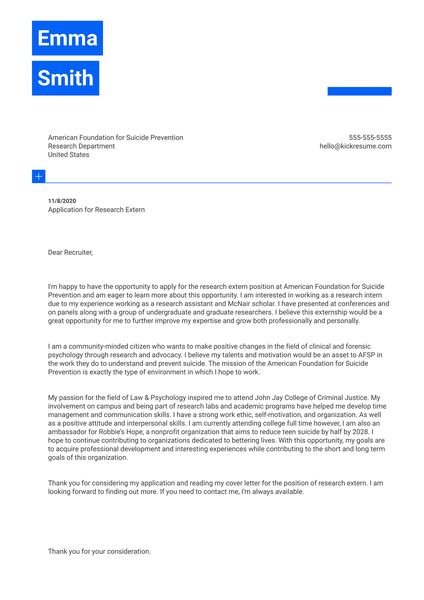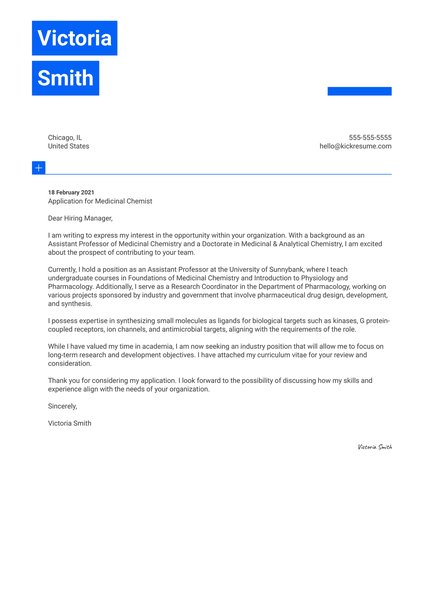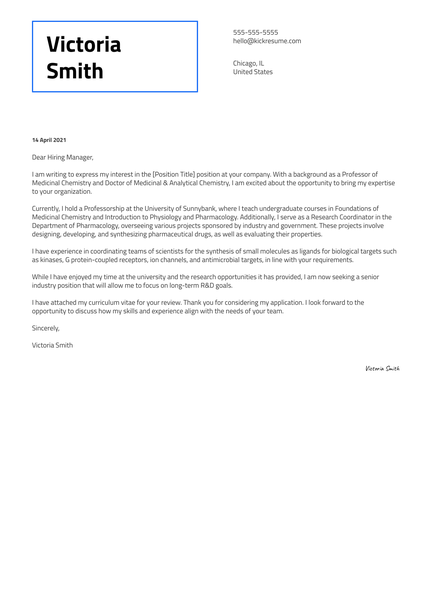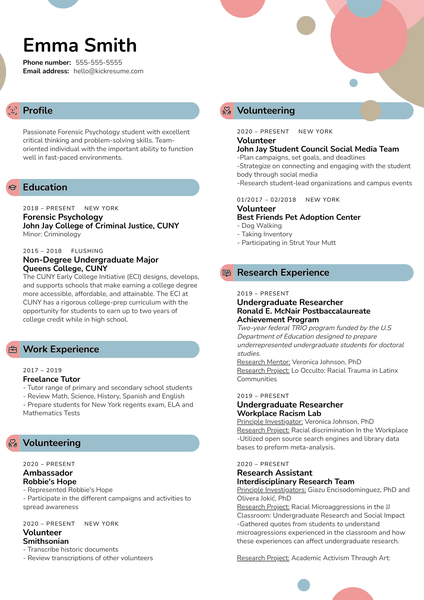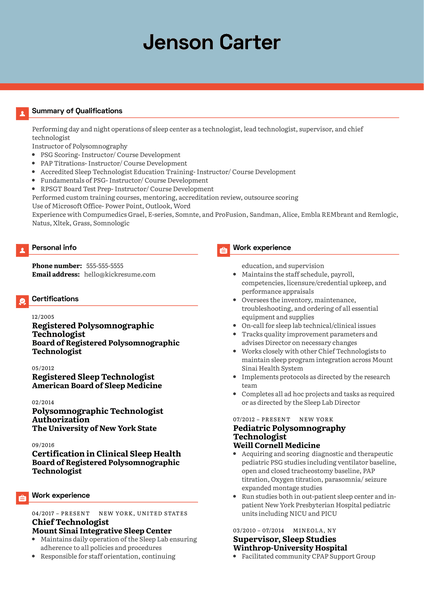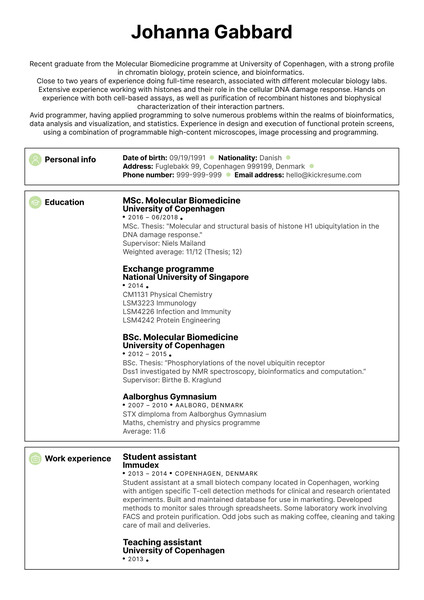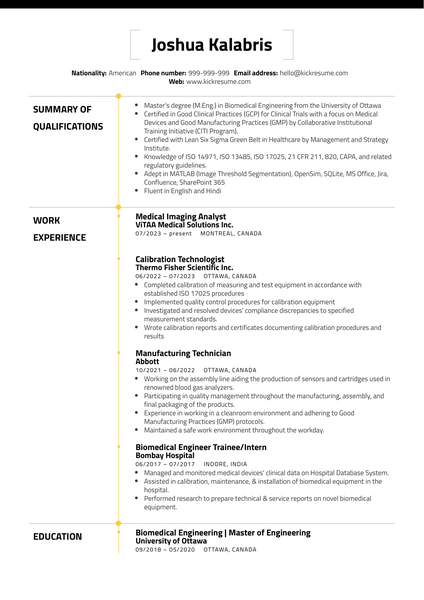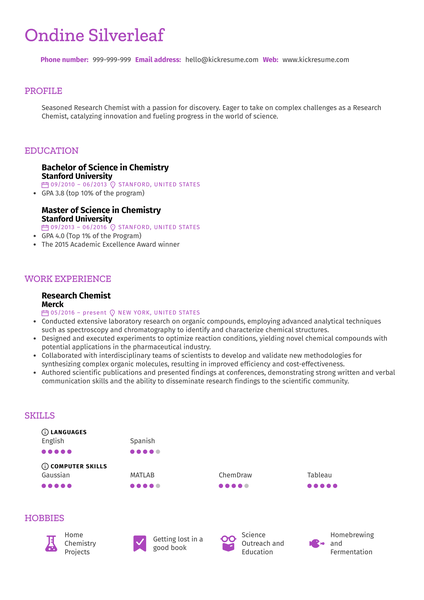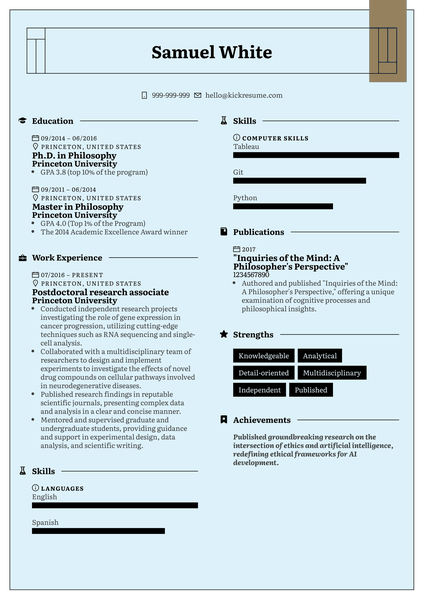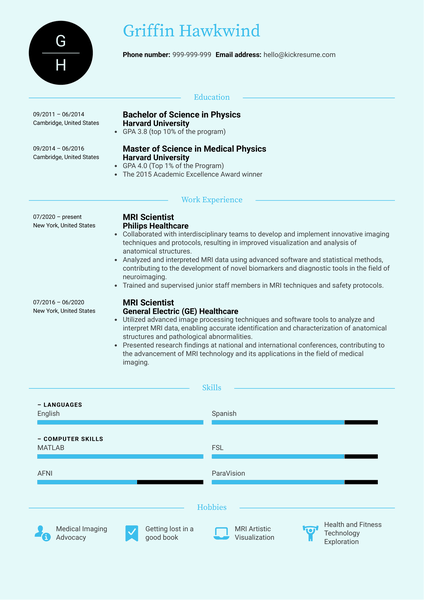Putting together an effective medical researcher cover letter doesn't have to be an experiment gone awry. Our expert tips, illuminating examples, and fuss-free templates are designed to streamline this process, ensuring your qualifications shine brighter than a freshly sterilized lab flask.
In this guide, we teach you everything you need to know about writing an effective cover letter as a medical researcher. Keep reading and learn:
- How to create a medical researcher cover letter header and headline
- Why it is so important to personalize your medical researcher cover letter
- What key details to use when writing your medical researcher introduction
- Ways to highlight your top skills and achievements as a medical researcher
- How to concisely conclude your medical researcher cover letter
- Where to access the best resources for job-seeking medical researchers
1. How to create an effective medical researcher cover letter header and headline
Like with a medical research report, the first step in writing a medical researcher cover letter is to ensure your formatting is correct.
To format a cover letter properly, you must create a visually appealing cover letter header and cover letter headline. The header comes first, aligned in either the top-left or top-center of the document, and should include:
- Your name and professional title
- Your professional contact information
- A formal address of the company you are applying to
Here is an example of a well-formatted medical researcher cover letter header
Matt Jacobs, Medical Researcher
(123) 456-7890 | mattjacobs@email.com | linkedin.com/in/matt-jacobs
To: Kenzie Medical Research Center
1234 Street Address
Athens, GA 30601
Next, you will write a short headline — similar to a paper title — that conveys the main idea of your cover letter. This headline should include at least one keyword that is highly relevant to the position, such as the position title, and one or two powerful adjectives and/or verbs.
Here is an example of a well-written headline from a medical researcher’s cover letter
My Top 4 Findings as a Medical Researcher & How I Can Apply My Research Skills at Your Institution
2. How to personalize your medical researcher cover letter
Personalizing a medical researcher cover letter is always a crucial step of the writing process.
This involves researching the employer beforehand to identify key details about them, their company, and their medical research department that you can reference within your letter. By doing so, you make your letter much more relevant and high-value to the employer.
Additionally, you should look into who at the employer’s company — be it the company owner or a hiring manager — is in charge of hiring processes and create a personalized greeting that addresses this exact person by name.
Here are 3 examples of personalized cover letter greetings
- Dear Head Research John Applewood,
- Dear Mr. John Applewood,
- Dear Mr. John Applewood & the Medical Research Team,
3. How to craft a compelling medical researcher cover letter introduction
Remember that research you did to personalize your cover letter? It’s time to put it to use.
In the introductory paragraph of your medical researcher cover letter, you should discuss your top qualifications for the position, as well as explain briefly why you are the ideal candidate. This will require you to reference one of the needs of the company to accomplish this effectively.
Here is an example of an excellently written medical researcher cover letter introduction
Dear Head Researcher John Applewood,
I am a medical researcher with 9+ years of specialized experience studying vaccines for highly infectious diseases and viruses. Given the recent retirement of one of your company’s top experts on viral infections, my experience and expertise could be put to great use in filling this gap in your research team.
4. How to highlight your top skills and achievements as a medical researcher
Now that you have thoroughly hooked the employer’s attention with your introduction, it’s time to delve into deeper insights about your qualifying skills and achievements as a medical researcher.
Continue to reference your personalized research on the company whenever possible. Additionally, include as many relevant, contextual, and quantifiable details as you can about your skills and achievements to make them sound more high-value to the employer.
Here are 6 medical researcher skills to describe in a cover letter
- Gathering and storing medical research samples
- Conducting experiments
- Properly documenting research and experiment findings
- Presenting findings to medical boards
- Submitting research for peer-review
- Collaborating with other medical researchers
Here is an example of how to describe an accomplishment in a medical researcher cover letter
As a medical researcher at [Former Employer], I served as a junior member on a research team for developing a new anxiety treatment for people under 18. In clinical trials, the treatment my team and I developed resulted in a 55% decrease in severe anxiety among patients, with 90% of patients reporting better performance in school and extracurricular activities following the study.
5. How to concisely conclude your medical researcher cover letter
The last step in writing your medical research cover letter is to write an effective and concise conclusion.
This should include:
- An enthusiastic sentence saying you are looking forward to hearing from them
- An additional sentence stating you will follow up, including how you will contact them or how they can contact you
- A formal sign-off
Here is an example of an effective conclusion from a medical researcher's cover letter
I am deeply grateful for your time and consideration in reading my letter and am eager to learn more about this opportunity. You may best reach me at (123) 456-7890, Monday through Friday, between the hours of 7 a.m. to 4 p.m. I patiently await your response, though I do intend to follow up next Friday afternoon if I have not heard back.
Sincerely,
[Applicant Name]
If you have ever wondered how a cover letter differs from a resume, this article will tell you everything about the key differences between the two.
6. Best resources for job-seeking medical researchers
Conducting a job search doesn’t have to feel like an endless experiment without results. As a medical researcher on a career quest, explore these resources for success:
- Industry-specific job boards: Websites like BioSpace, New Scientist Jobs, and Nature Careers offer an extensive array of opportunities in the medical research field.
- Networking platforms: LinkedIn is a powerful tool for showcasing your research achievements, connecting with industry leaders, and spotting job recommendations.
- Professional organizations: Institutes such as the American Association for the Advancement of Science provide resources, including dedicated job boards and networking events.
- Online journals: Subscribing to scientific publications like The Lancet or JAMA can keep you up to date with the latest research, inspiring ideas, and potential career directions.
- Mentorship programs: Many universities and research institutions offer mentorship opportunities with experienced researchers who can guide your career journey.
Leverage these resources to advance your career and find the right lab coat fit for you.
Medical Researcher / Scientist Cover Letter FAQ
How important is it to tailor my Medical Researcher cover letter to each job I apply for?
Absolutely vital. Each job has its own set of requirements and a unique organizational culture. Tailoring your cover letter shows you've done your research and that you're genuinely interested in the role and the organization.
Should I mention all the research projects I've worked on in my cover letter?
No, but select key ones. Focus on one or two projects that most closely align with the job you're applying for. Discuss your role, the skills you used, and the impact of the research.
How can I highlight my technical skills in the cover letter?
Sure, technical skills are crucial in medical research. However, instead of just listing them, provide examples of how you've used these skills during your research and the outcomes.
How formal should the tone of my cover letter be?
Maintain a professional tone, but don't hesitate to showcase your enthusiasm for the role and your field of research. Aim for a balance between professionalism and passion.
Does my cover letter need to include why I want to work for the hiring company?
Yes, employers seek candidates who have an understanding of and enthusiasm for their work. Detailing why you want to work for the specific organization shows you're invested in them and see a future there.

